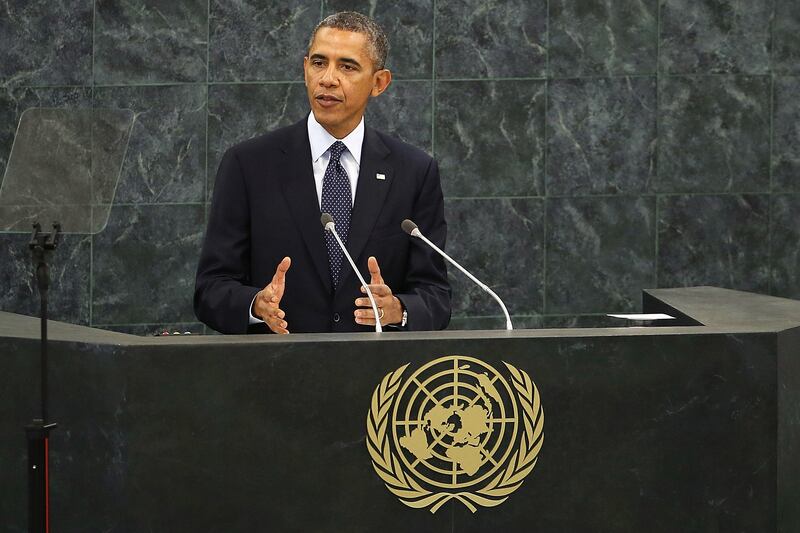President Barack Obama stood before the United Nations General Assembly today, scoffed at the idea of a Pax Americana, then suggested he’d like to lead the world community in establishing something that looks, in fact, very much like global peace in the American image.
“I believe that America is exceptional,” said Obama. Its ability to “stand up for the interests of all” is special. And the danger after an exhausting decade of war in the Muslim world, he said, is not that the United States will get more involved in building global peace—sometimes, if necessary by acts of war—but that it will turn its back and “create a vacuum of leadership.”
Obama said that right now he would focus American efforts on resolving the stand-off with Iran over its nuclear program. He also put a resolution of the incredibly intractable Arab-Israel peace process at the top of his agenda. And he reserved the right to intervene militarily wherever America’s core security interests were challenged, including Syria, but not only in Syria. He called for the international community to support all this, but looked determined to go ahead with or without consensus.
The United States would respect the sovereignty of other countries “wherever possible,” said Obama, but not when it comes to stopping terrorists who plot against Americans and not when it comes to blocking the proliferation of weapons of mass destruction, such as the chemical arsenal now under the control of Syrian president Bashar al-Assad.

Obama called for a strong U.N. resolution, building on an agreement forged by Secretary of State John Kerry and Russian Foreign Minister Sergei Lavrov, to eliminate the kind of weapons that were used in a horrific attack near Damascus in August. That disarmament process now appears to be moving forward, but is in its very early stages. The Russians, who could veto a resolution they don’t like, are trying to limit the threat of force against Assad if he balks. The resolution must have “consequences” said Obama, reminding the world that “without a credible military threat [from the U.S. government] the Security Council had demonstrated no inclination to act at all” to rein in Syria’s used of munitions long outlawed by the international community.
Obama’s insistence on the duty to intervene in other countries on humanitarian grounds was especially striking. The furious debate over planned U.S. military intervention showed a majority of Americans bitterly opposed to such actions. But in language that drew heavily on the writings and opinions of Samantha Power, the U.S. ambassador to the United Nations, Obama reasserted the idea that the world, led by the United States if necessary, must intervene to stop atrocities.
“While the United Nations was designed to prevent wars between states, increasingly we face the challenge of preventing slaughter within states,” said Obama. “There will be times when the breakdown of society is so great and violence so substantial that the international community must act.” He harked back to the horrors of Rwanda and Bosnia. He justified the controversial intervention by the United States, France and Britain in Libya, saying the civil war there might still be going on had these powers not acted.
Obama addressed at length what appear to be defrosting relations with Iran. The United States and Europe are searching for a diplomatic way to end Tehran’s development of nuclear technology that could be used to build nuclear weapons. Recently elected Iranian President Hassan Rouhani is waging a charm offensive, and speculation is now rampant around the United Nations that he and Obama may have a brief, informal, but highly symbolic meeting, and that they may even shake hands.
Perhaps more important to the mullahs who rule Iran, Obama in his speech ruled out American support for attempts to change the regime. He talked of building ties based on mutual interests and “mutual respect,” a theme often repeated by the Iranian government. But that would come after Iran dealt with what Obama called its “nuclear responsibilities.” Iran’s “words have to be matched by actions that are transparent and verifiable,” he said. Iran has a long record of making promises about its peaceful nuclear intentions, then breaking them or, as Obama put it, “evading” them.
On the Arab-Israeli front, Obama came down firmly in support of a two-state solution. The Israeli occupation of the Palestinian West Bank “is tearing at the fabric of the Jewish state,” Obama said, even as he reaffirmed the American commitment to the security of Israel.
Turning to Egypt, Obama criticized the record of elected President Mohamed Morsi, overthrown in July after enormous protests, but he also noted the abuses of the military leadership that brought Morsi down. There, said Obama, “the United States has purposely avoided choosing sides.”
In many respects the speech was a pointed riposte to an op-ed by Russian President Vladimir Putin recently published in The New York Times. The autocratic leader criticized Obama for his past insistence on the exceptional role America can play in the world. But it’s clear that one of Putin’s main goals is to reassert Russian global influence, lost with the collapse of the Soviet Empire more than 20 years ago. Putin’s strong support for the Assad regime in Damascus is part of that strategy.
Referring to past confrontations between the West and the empire builders in Moscow, Obama suggested, “We are no longer in a Cold War, there is no ‘great game’ to be won.”
Perhaps not. But as Obama continues to fight for the empire of American exceptionalism, those distant memories may not seem so distant anymore.





